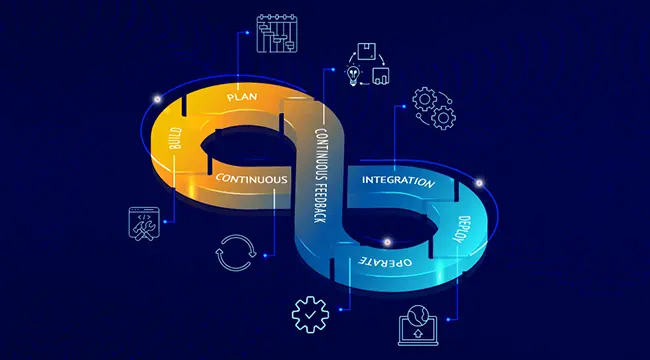In this digital age, delivering software with speed and efficiency has become the standard. Therefore, businesses must build, test, and deploy software fast while also making sure to provide high quality and scalability—this is where DevOps automation marks its importance.
With the help of DevOps automation services, organizations are able to streamline operations and accelerate delivery with the least hurdles. Let’s explore further about it below.

DevOps automation refers to using tools and technologies so that repetitive tasks during the process of software development can be done automatically. For instance, rather than perform tasks like coding, testing, or deployment manually, they can be simply handed to automation. This also allows us to increase speed, minimize human error, and bring out consistency.
Automated tools instantly alert developers to bugs or integration issues. Faster feedback allows for quick resolution, avoiding costly delays and ensuring rapid iteration.
In DevOps, ‘Dev’ stands for development, and ‘Ops’ stands for operations. Together it becomes a set of practices that combines both IT operations and software development to reduce the length of the development cycle.
What is DevOps in simple words?
In simple terms, DevOps means that IT teams and software developers work together to create a software from scratch: from its development to testing, in order to bring more reliable results.
What do DevOps do?
DevOps professionals are responsible for automating workflows, managing infrastructure, monitoring systems, ensuring continuous integration and deployment along maintaining application performance.
What is DevOps engineering?
DevOps engineering is about focusing on automating the software development life cycle, where IT professionals and software developers work closely to do that.
Whether you have just started or you are an enterprise, DevOps automation can truly be your key to attaining speed, reliability, and scalability in software development. By integrating automation you will be able to innovate faster and stay ahead of your competitors—so, what’s the wait for? Reach out to us now!
With the help of DevOps automation services, organizations are able to streamline operations and accelerate delivery with the least hurdles. Let’s explore further about it below.

Understanding DevOps Automation
As things are taking a modern turn today, DevOps automation is becoming the norm in software houses. But, what is it really?DevOps automation refers to using tools and technologies so that repetitive tasks during the process of software development can be done automatically. For instance, rather than perform tasks like coding, testing, or deployment manually, they can be simply handed to automation. This also allows us to increase speed, minimize human error, and bring out consistency.
How DevOps Automation Speeds Up Software Development
Faster CI/CD Pipelines
For continuous integration and continuous deployment, DevOps has become mighty significant because of its capability to reduce time-to-market since it automates tasks like software testing, coding, and deployment. Thus, the development team doesn’t have to wait for manual reviews or testing anymore. With just a single push of code, the entire pipeline—from checking the code, running tests, and building the application, to deploying it—can be triggered automatically.Error Reduction through Automation
When humans perform tasks like configuration themselves, there’s always a fixed probability of causing errors. By using DevOps automation services, software teams can script environment, repeat deployment, and avoid bugs—resulting in fewer product failures and more reliable results. This is specifically useful for complex projects, like the development of IoT products.Accelerated Feedback Loops
The best part about DevOps automation is that automated tools instantly warn developers about incoming bugs or integration issues. So, quick reviews allow for a quicker resolution leading to zero costly delays and ensuring rapid iteration.Automated tools instantly alert developers to bugs or integration issues. Faster feedback allows for quick resolution, avoiding costly delays and ensuring rapid iteration.
Scalable and Consistent Environments
DevOps automation surely brings a lot of consistency to the workflow, especially in the development, testing, and production sections. The reason behind this is, that with the assistance of certain tools like Docker or Terraform, DevOps technologies allow teams to set up the same environment every time—allowing the code to behave the same no matter in which computer or server it is being run. Consequently, the software team has to encounter fewer errors and make faster deployments.Integrated Monitoring and Alerts
With DevOps automation teams don’t have to stress about encountering serious challenges because it includes monitoring tools that keep tracking performance, uptime, and errors. So, whether it’s an e-commerce platform or an enterprise tool, these warnings will help to keep your system well maintained.DevOps Services and Solutions That Drive Speed
By adopting the right DevOps solutions and services, you can come across significant differences in your software delivery. Here’s how:- DevOps consulting services: Gives strategic guidance on implementation.
- DevOps Development Services: Provides custom automation and pipeline setup.
- DevOps Automation Services: Offers tools to automate testing, deployment, monitoring
- DevOps Solutions Company: Provides end-to-end deployment, infrastructure, CI/CD
- DevOps Services Company: Gives access to dedicated resources for DevOps integration.
DevOps for Beginners: Where to Start?
If you are just stepping into DevOps, here are some core points that you must understand:- Collaboration between development and operations
- Automation of repetitive tasks
- Continuous delivery and integration
- Monitoring and performance tracking
- GitHub – for version control
- Jenkins – for CI/CD
- Docker & Kubernetes – for containerization
- Ansible, Puppet – for configuration management
Benefits of Working with a DevOps Development Company
By working with a professional DevOps development company, you will be provided with:- Experienced engineers
- Proven frameworks and templates:
- Access to cutting-edge DevOps software
- Scalable infrastructure strategies
- Continuous optimization and support
DevOps Best Practices for Faster Delivery
Follow these DevOps best practices to get maximized results:- Automate Everything – From code integration to testing and infrastructure
- Version Control Everything – Not just code, but infrastructure and scripts
- Build Incrementally – Deploy smaller, manageable features frequently
- Monitor Continuously – Implement logging and alerting systems
- Adopt Infrastructure as Code (IaC) – For consistency and scalability
Frequently Asked Questions (FAQs)
What does DevOps stand for?In DevOps, ‘Dev’ stands for development, and ‘Ops’ stands for operations. Together it becomes a set of practices that combines both IT operations and software development to reduce the length of the development cycle.
What is DevOps in simple words?
In simple terms, DevOps means that IT teams and software developers work together to create a software from scratch: from its development to testing, in order to bring more reliable results.
What do DevOps do?
DevOps professionals are responsible for automating workflows, managing infrastructure, monitoring systems, ensuring continuous integration and deployment along maintaining application performance.
What is DevOps engineering?
DevOps engineering is about focusing on automating the software development life cycle, where IT professionals and software developers work closely to do that.
Whether you have just started or you are an enterprise, DevOps automation can truly be your key to attaining speed, reliability, and scalability in software development. By integrating automation you will be able to innovate faster and stay ahead of your competitors—so, what’s the wait for? Reach out to us now!



